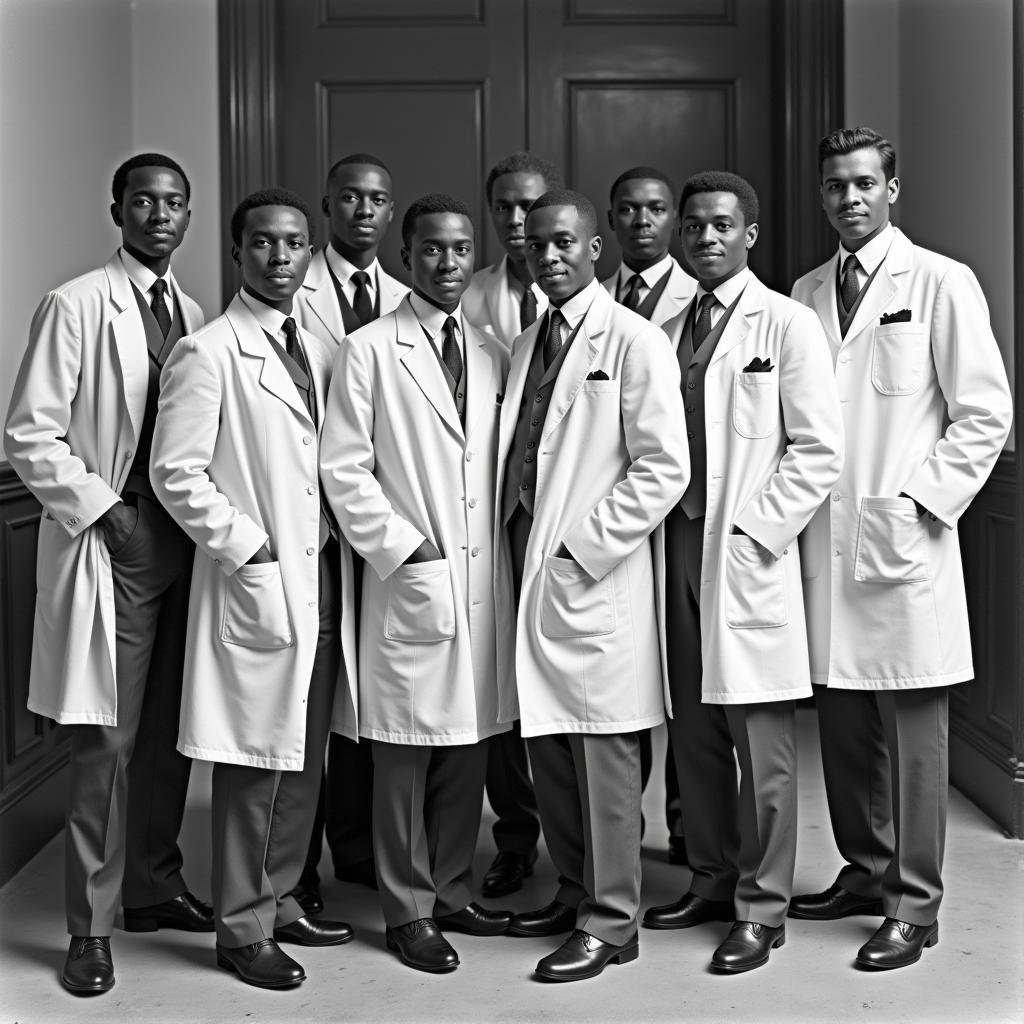African Americans in Medicine: A Legacy of Resilience and Innovation
African Americans have made significant contributions to medicine despite facing systemic racism and discrimination. This article explores the inspiring journey of African American medical professionals, highlighting their triumphs over adversity and their lasting impact on healthcare.  African American Doctors in a Historical Photograph
African American Doctors in a Historical Photograph
Overcoming Obstacles: The Struggle for Equality in Medical Education
For generations, African Americans faced significant barriers to entering the medical profession. Segregated medical schools and limited opportunities for training created a system designed to exclude. However, the unwavering determination of individuals like Dr. Daniel Hale Williams, who performed the first successful open-heart surgery in 1893, paved the way for future generations. native african These pioneers established hospitals and medical schools specifically for African Americans, fostering a legacy of resilience and a commitment to serving underserved communities.
Early Pioneers and the Founding of Black Medical Institutions
Institutions like Meharry Medical College and Howard University College of Medicine became vital centers for medical training and research, providing opportunities that were otherwise denied. These institutions not only trained generations of African American doctors but also served as beacons of hope and symbols of community empowerment.
What were the main challenges faced by early African American medical professionals? They faced segregation, limited access to resources, and prejudice within the medical establishment.
Groundbreaking Discoveries and Medical Advancements
African American physicians and scientists have made groundbreaking contributions to medical knowledge and practice. From developing innovative surgical techniques to pioneering research in public health, their work has saved countless lives and improved the health of communities around the world.
The Legacy of Dr. Charles Drew: Revolutionizing Blood Transfusion
Dr. Charles Drew’s revolutionary work on blood plasma transfusions during World War II transformed medical care and saved the lives of countless soldiers. His innovative techniques for preserving and storing blood plasma made large-scale transfusions possible, impacting medical practice worldwide. african american universities,
Addressing Health Disparities: A Focus on Community Health
African American physicians have also been at the forefront of addressing health disparities and advocating for better healthcare access in underserved communities. Recognizing the unique challenges faced by these populations, they have worked tirelessly to improve health outcomes and promote health equity. What role did African American physicians play in the Civil Rights Movement? They provided medical care to activists, documented police brutality, and advocated for equal access to healthcare, highlighting the intersection of health and social justice.
The Continuing Struggle for Representation and Equity
Despite significant progress, challenges remain for African Americans In Medicine. Underrepresentation in leadership positions, implicit bias in healthcare settings, and persistent health disparities continue to be pressing concerns. african american genomics
Mentorship and Pipeline Programs: Inspiring the Next Generation
Mentorship programs and initiatives aimed at increasing diversity in medical schools are crucial for ensuring future generations of African American medical professionals. These programs provide support, guidance, and encouragement to aspiring doctors, helping to create a more inclusive and equitable medical landscape. african american inventions in usa
A Bright Future: Celebrating Achievements and Embracing Diversity
African Americans in medicine have a rich history of resilience, innovation, and dedication to serving others. Their contributions have shaped the medical landscape and continue to inspire future generations. By celebrating their achievements and actively working towards greater diversity and inclusion, we can ensure a brighter future for healthcare. african american rhodes scholars
Conclusion
African Americans in medicine have overcome immense obstacles to leave an indelible mark on healthcare. Their unwavering commitment to excellence and service continues to inspire us all. As we move forward, it is essential to recognize their invaluable contributions and work towards a future where diversity and inclusion are at the heart of medicine.
FAQ
- Who was the first African American to graduate from a medical school in the United States?
- What are some of the most significant contributions of African Americans to medical science?
- How can we address the underrepresentation of African Americans in medical leadership positions?
- What are some resources available for aspiring African American medical professionals?
- What role do historically Black colleges and universities (HBCUs) play in training African American physicians?
- How does implicit bias affect healthcare outcomes for African American patients?
- What are some current initiatives aimed at promoting diversity and inclusion in medicine?
When you need assistance, please contact us by Phone: +255768904061, Email: kaka.mag@gmail.com Or visit us at: Mbarali DC Mawindi, Kangaga, Tanzania. We have a 24/7 customer service team.
